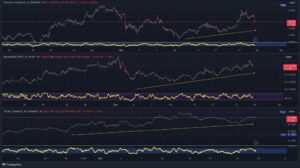Last updated:
 Why Trust Cryptonews
Why Trust Cryptonews

A recent report indicates that Japan is slow to approve cryptocurrency-based exchange-traded funds (ETFs), even as global markets like the U.S., Australia, and Hong Kong move forward.
Despite Japan’s ambitions to lead in crypto, regulators remain cautious, largely due to ongoing concerns over taxation and strict regulations that hinder progress.
Japan’s 55% Tax on Digital Asset Gains Makes Crypto ETFs Less Appealing
In Japan, profits from digital asset investments are classified as miscellaneous income, resulting in a tax rate as high as 55%.
This is in sharp contrast to the roughly 20% capital gains tax applied to traditional ETFs.
The disparity in tax treatment has raised concerns among investors and advocates of crypto ETFs, as the heavy tax burden on cryptocurrency profits discourages potential investment compared to more traditional avenues.
Adding to these challenges is Japan’s regulatory framework, which currently prohibits the inclusion of crypto assets in investment trusts, including ETFs.
This regulatory barrier further complicates efforts to push crypto ETFs into the mainstream.
Although some dialogue has emerged this year, with the Ministry of Finance and the Financial Services Agency (FSA) signaling a willingness to discuss crypto regulation, there has been little movement towards major reforms such as the approval of spot crypto ETFs.
Other Countries Embrace Crypto ETFs as Japan Lags Behind
While Japanese regulators continue to hesitate, countries like the U.S., Australia, and Hong Kong are moving ahead with crypto ETFs, enjoying increased adoption.
In the U.S., investors recently injected $329 million into BlackRock’s iShares Bitcoin Trust, underscoring the growing demand and substantial inflows in this sector.
Despite the cautious stance of Japanese regulators, some traditional asset managers are preparing for the possibility of launching crypto ETFs in Japan if the regulatory environment shifts.
For example, Franklin Templeton has partnered with Japanese financial services group SBI Holdings to establish a new digital asset joint venture.
This collaboration seeks to develop innovative products, including crypto ETFs, in anticipation of a more favorable regulatory landscape.
Tamaki Pushes for Crypto ETF Approval with Tax Cut Proposal
Yuichiro Tamaki, leader of the Democratic Party for the People (DPP), is pushing for reform in cryptocurrency taxation as part of his campaign for Japan’s upcoming general election on October 27.
Tamaki has proposed reducing the tax on crypto assets to 20%, aligning it with the tax rate on traditional investments.
He believes this change is crucial for positioning Japan as a competitive player in the global Web3 space.
If Tamaki wins the election, his proposed tax cuts and regulatory reforms could pave the way for major changes in Japan’s crypto industry, including the long-awaited approval of crypto ETFs.
His policies, if implemented, could transform Japan into a major hub for cryptocurrency investment, fostering innovation and competitiveness in the digital asset sector.















